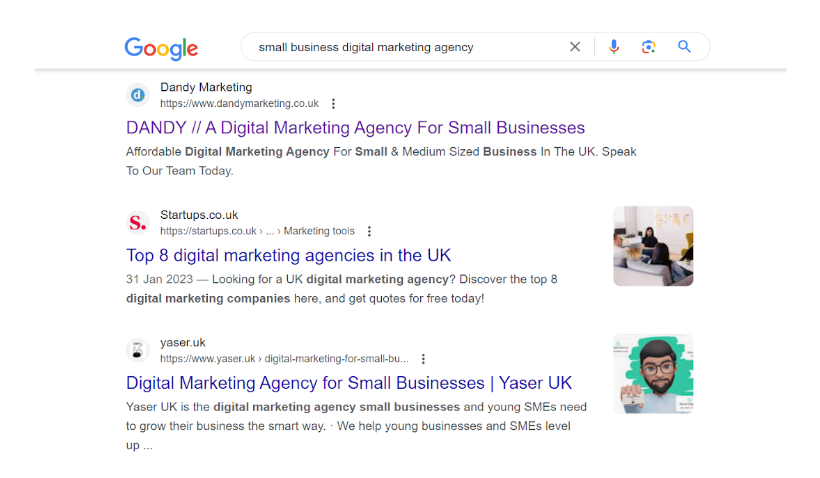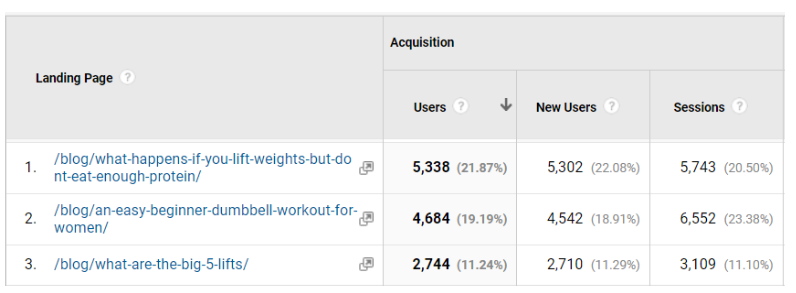What is SEO and how does it work for small businesses?

There’s no doubt about it, in 2023 every small business should have an SEO strategy (search engine optimization) to be able to stand out from the crowd.
68% of online experiences begin with search engines.
Whether you’re selling a service or looking to grow your eCommerce business, in B2C or B2B, if you’re not ranking on Google search results you simply won’t be getting great levels of traffic to your website.
But it’s not all doom and gloom! The Dandy team is here to explain everything about small business SEO and how with a bit of effort and patience, you can watch your company rise up the search engine rankings.
Let’s dive into what SEO is and how it works for small businesses, and why it’s essential for your small business to have a solid SEO strategy.
What is SEO?
SEO (Search Engine Optimisation) is the all-encompassing practise of assisting your website in ranking higher in search engine results.
When you put something into Google, Google must then decide which websites to display to you.
It considers hundreds of variables known as “ranking factors.“, such as your off page SEO (backlinks) and on page SEO elements (e.g blog content, meta description etc.)
Most folks don’t even look past the first five results. So, if you’re not ready to try PPC in order to appear in paid search results, the only way to get on that first page is to conduct SEO.
SEO helps your website appear in the top 5 search results for relevant search queries, increasing organic website traffic to your organisation.
How do search engines rank websites?
Search engines such as Google and Bing employ a variety of ranking factors to determine and deliver the most relevant material for a given search term.
However, before they can do so, search engines must crawl and index websites. Here’s what crawling and indexing are all about.

Crawling
Yep, it sounds a tad creepy, but crawling is a method of discovery that occurs when search engines dispatch crawlers or spiders to find refreshed and new content.
Crawlers examine web pages and follow links on those pages, just as you would if you were exploring web material.
They navigate from link to link, returning data about those web pages to Google’s computers.
Make sure that every single page of your website is crawled if you want to be visible in organic search results.
Indexing
Indexing is the process through which search engines, such as Google, organise information prior to a search in order to offer quick results to users’ requests.
In general, Google and other search engines have structured data about web pages and other content that they are aware of.
Once these pages have been crawled then they have the opportunity to be indexed. Search engines may use the information they have about these pages and their content allowing them to decide whether or not to include this content in their search results.
How small and local businesses can use SEO effectively
Let’s look at some of the components that can influence your search engine optimisation ranking.
Content Marketing
Prioritising your content marketing strategy in your SEO approach will result in new, informative pieces of material that use your most relevant keywords, which you’ll find by conducting keyword research.
More importantly, Google prefers new and updated material. Newly published material is quickly indexed and helps to boost your ranking. The more material you add, appropriately placed around your keyword research the higher your SEO ranking tends to be.
Think…
- Blog posts and articles
- Social media content
- Ebooks and whitepapers
- How-to guides and tutorials
- Videos and audio recordings
- Infographics or other visual content.
Building a content and blogging strategy for your small business can drive huge amounts of top-of-the-funnel traffic to your website, capturing all of those loose leads you might miss out on without any SERP rankings.
Just look at the monthly traffic these three blogs bring in for one of our clients:

Refreshing Content
Creating new material isn’t the only approach to keep your content current.
You can additionally keep your content fresh by upgrading posts, revising them to make them more effective, or gradually adding new information and statistics.
Though developing content requires time and resources, it will more than pay for itself in the long run.
Consumers require quality content for a deeper understanding of the value your organisation can deliver. Search engines LOVE exceptional content.
On-page SEO
On-page SEO (sometimes known as “on-site SEO”) is the practice of optimising the content of web pages for search engines and users. On-page SEO practises commonly used include optimising title tags, meta descriptions, content, internal links, and URLs.
When content contains the same SEO keywords as your search query, this is the most fundamental indicator that it is relevant. When it comes to websites, for example, if those keywords occur on the page or in the headings or body of the text, it’s a clear indication to Google what the page is about and what potential keywords the page should rank for.
Common examples of on page SEO include:
- Headings
- Sub-headings
- Internal linking
- Images
- Alt-text
- Keywords
- Mobile friendliness
Off-page SEO
Off-page SEO refers to operations performed away from a website in order to improve the site’s search engine rankings. Building backlinks, boosting branded searches, and increasing interaction and shares on social media are all common off-page SEO strategies.
Here’s a list of great link building methods:
- Outreach
- Digital PR
- Broken link building
- Guest blogging
- Link reclamation
According to a HubSpot survey, 75% of SEO is off-page and 25% is on-page.
In other words, off-page SEO refers to anything you do outside of your website to make Google and other search engines regard your website as trustworthy and authoritative.
For example, for our client Nilufer Danis we got them featured in The Sun, The Express and The Scotsman simply by providing some expert tips.

Looking for expert SEO services for your small business website?
We hope you found this guide to SEO simple, helpful and to the point, just like we are.
Remember that search engine optimisation takes time to produce results, which is why our marketing experts are here with the SEO tools to take tout small business to the next level.
We will collaborate with you to identify your target audience and what they are looking for, and then we will create high-quality, engaging content that is optimised for the keywords you need to rank for.
Considering SEO management services? Why not give us a shot? To get you started, we even provide a free, no-obligation website SEO evaluation.
Check out our SEO packages or Book Your Free SEO Audit today!
What is SEO and how it works for small businesses FAQs
Is SEO worth it for small businesses?
Yes, despite the increased competition on SERPs, SEO is still worthwhile for small businesses. A strong Google presence is critical for building brand awareness and trust, as well as bringing your items or services in front of your target audience.
What is SEO and how does it work?
SEO stands for Search Engine Optimisation, and it is the act of optimising a website’s technical configuration, content relevancy, and link popularity so that its pages are easier to locate, more relevant and popular to user search queries, and, as a result, search engines rank them higher.
Is SEO still relevant in 2023?
Yes, SEO is still relevant in 2023 and will continue to be so in the foreseeable future. This is because SEO allows search engines to crawl and categorise your website in order to better rank web pages when visitors enter a search query. Google and other search engines seek to help people find answers to their questions.

